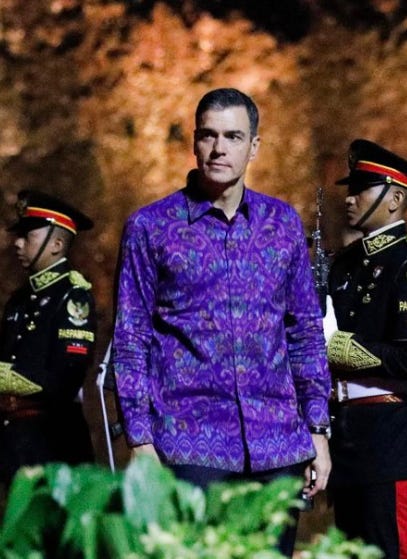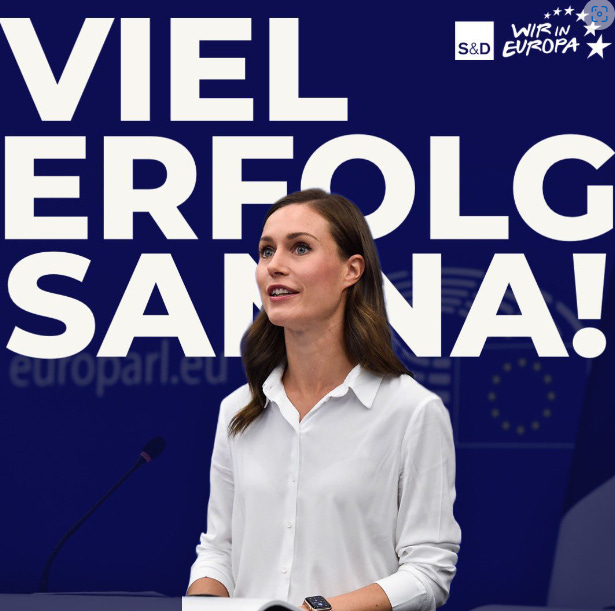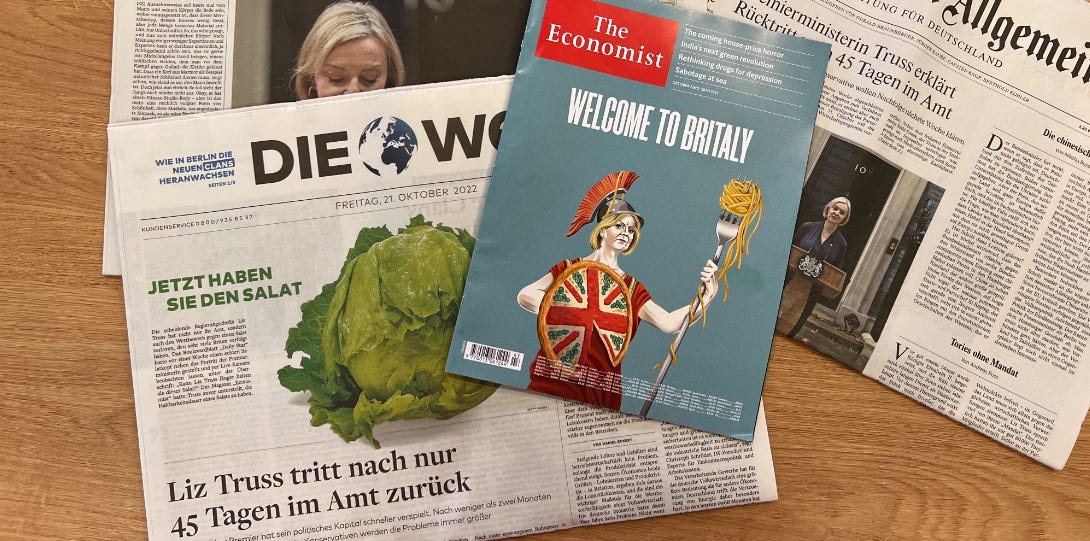Another potential regime changes after UK (3x time; Boris - Liz Truss - Rishi Sunak), Italy (Mario Draghi to Giorgia Meloni), Finland (Sanna Mirella Marin, still waiting elected PM after Marin lose in latest election) in the wake of prolonged Russia - Ukraine war. Spain’s PM calls snap election after conservative and far-right wins in local polls. A really risky move. Sanchez is hoping to mobilize fear of the far-right's advance, but that may fail, and a center-right / far-right alliance in power would mark a huge moment for post-Franco Spain.
Sanchez in G20 Bali Indonesia, November 2022
As Russia’s war in Ukraine takes a rising toll on Europe’s economies, growth is flagging across the continent, while inflation shows little sign of abating. Current PM, President, Chancellor facing bigger challenge from opposition, and in some election opposition wins.
The conservative People’s party (PP) – which used the votes as a de facto referendum on Sánchez’s coalition with the far-left, anti-austerity Unidas Podemos alliance – scored an emphatic win, far exceeding expectations and building on its momentum in the polls. As well as securing absolute majorities in the Madrid region and the city council, it took regions including Aragón, Valencia and the Balearic islands from the prime minister’s Spanish Socialist Workers’ party (PSOE).
The PP’s failure to achieve the necessary majorities in many of the newly-won regions, however, means it will have to strike deals with the far-right Vox party, which also comfortably increased its showing on Sunday.
Sánchez’s high-stakes gamble, which he announced just hours after the results came in, is based on the hope that any such deals will help to galvanise and mobilise leftwing voters and prove distasteful to supporters on the PP’s moderate wing.
Speaking at the Moncloa palace in Madrid on Monday morning, Sánchez said he had informed King Felipe of his decision to dissolve parliament and call a general election on 23 July, five months before the poll had been scheduled to be held.
“I’ve taken this decision in view of yesterday’s election results,” he said. “The first consequence of the results is that magnificent socialist regional presidents and mayors who have governed impeccably have lost despite the fact that many of them increased their support yesterday. The second consequence is that many, many institutions will be administered by new majorities comprising the People’s party and Vox.”
Sánchez said that while Sunday’s votes had been municipal and regional, they had “transmitted a message” that transcended local considerations and demanded a democratic response. Announcing the election, he stressed Spain’s economic recovery since the start of the pandemic and the country’s forthcoming EU presidency, and said it would be for the Spanish people to decide what happened next.
“I think we need a clarification when it comes to what the Spanish people want, a clarification when it comes to the policies that the national government should offer, and a clarification when it comes to the political groups that should lead this phase,” he said.
“There’s only one infallible method for resolving those doubts, and that method is democracy. As a result, I think the best thing is for Spanish men and women to have their say and to decide the country’s political direction as soon as possible.”
The PP’s leader, Alberto Núñez Feijóo, welcomed the early election but suggested Sánchez had called it in an attempt to distract from the drubbing his government had received on Sunday.
“Announcing a snap election won’t hide what happened yesterday,” he said. “Spaniards have said enough is enough, and I’m grateful that that sentiment has translated into a clear victory for the People’s party. But, even more importantly, another way of doing politics has started to win.”
Feijóo has attempted to move the PP back to the political centre ground after the party lurched to the right under his predecessor, Pablo Casado, who embraced a harder line in an effort to stop the party being outflanked by Vox. Despite the fact that Casado once famously attacked the far-right party for practising politics based on “fear, anger, resentment and revenge”, the PP formed an often rocky coalition government with Vox in the Castile-León region last year.
Eyes will now turn to Podemos and Sumar, the new leftwing platform led by the labour minister and deputy prime minister, Yolanda Díaz, to see whether the two groups join forces to fight the election.
Podemos suffered disastrous results on Sunday as its support collapsed in key regions. The party’s leader, Ione Belarra, went on the offensive on Monday, describing the PP and Vox as a “reactionary wave” that would seek to cut public services, bring in privatisation and reverse the progress the coalition government had made on tackling the climate emergency, improving housing and protecting social rights.
Europe’s advanced economies will grow by just 0.6 percent next year, while emerging economies (excluding Türkiye and conflict countries Belarus, Russia, Ukraine) will expand by 1.7 percent, according to projections in our latest World Economic Outlook. That’s down by 0.7 percentage point and 1.1 percentage points.
This winter, more than half of the countries in the euro area will experience technical recessions, with at least two consecutive quarters of shrinking output; among these countries, output will fall, on an average, by about 1.5 percent from its peak.
Next year, Europe’s output and income will be nearly half a trillion euros lower as compared to the IMF’s pre-war forecasts—a stark illustration of the continent’s severe economic losses from the war.
And while inflation is projected to decline next year, it will stay significantly above central bank objectives, at about 6 percent and 12 percent, respectively, in advanced and emerging European economies.
Growth and inflation could both get worse than these already sobering forecasts. European policymakers have swiftly responded to the energy crisis and built adequate gas storage ahead of the heating season, but further disruptions to energy supplies could lead to more economic pain.
Even without any new energy supply disruptions, inflation could remain higher for longer. Most of the inflation surge so far is driven by high commodity prices—primarily energy, but also food. While these prices might remain elevated for some time, there is hope that they will stop increasing and thereby contribute to a steady decline in inflation throughout 2023.
Díaz, meanwhile, signalled that her movement was more than ready for the early election. “We have a project that can provide answers to our country’s social, ecological and economic issues,” she said on Monday. “We’re heading out to win against Feijóo’s black Spain. The people are waiting for us.”
Sánchez’s decision to call an early election is not his first big gamble. After being defenestrated as party leader in 2016, he staged a triumphant comeback that culminated in the vote of no-confidence that cast the PP out of office in 2018. He also propelled the PSOE to two general election victories in 2019, although the party fell short of a majority on both occasions, leading to the coalition with Unidas Podemos.
Antonio Barroso, an analyst at the political consultancy Teneo, said it remained unclear whether Sánchez’s latest bet would pay off.
“The PP has maintained its lead in opinion polls despite sharing power with Vox in the Castile-León region since 2022,” he said. “This creates some doubts about the effectiveness of a strategy centred on mobilising leftwing voters against a potential rightwing government.
“Moreover, Spain has never held a general election in the middle of the summer, which generates some uncertainty regarding whether the chosen date will have a negative effect on turnout.”






